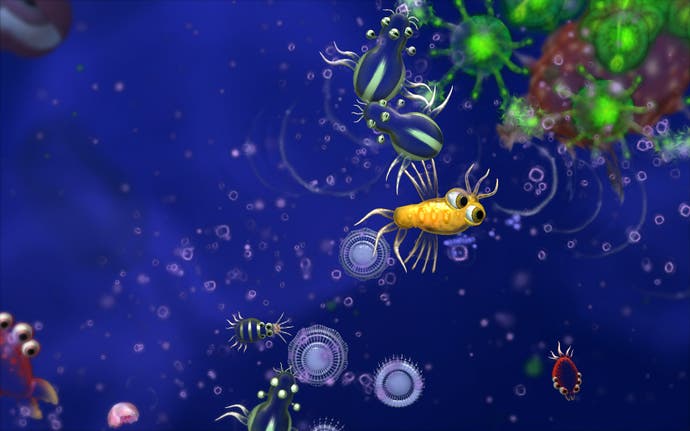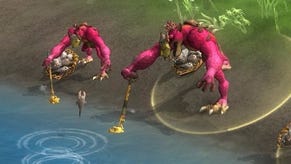Spore
We looked over the hill and we saw fire.
At the heart of Spore, say some, lies a fascinating, amusing, baffling contradiction: you're the Creator in the ultimate God game, in which you can succeed by imposing your beliefs on others, and yet Maxis' universe - a convincing mishmash of procedural and many-user generated species - is, as the game puts it, "an epic journey of evolution". One tends not to get on with t'other.
However, as with so many things (religious fundamentalism, for instance), the mistake was to accept the premise; Spore isn't a God game, it's a many-Gods game. In it you guide the development of your species from a single cell in a 2D ocean onto its newly formed feet, along a prickly path to abstract reasoning, problem-solving, emotion, science and interstellar conquest, with rest-stops in savagery, tribalism and tank-rushing. As you do this, thousands of other real-life players do the same and their species become part of your game-world, adopted by the AI ruling their own planets to greater or lesser effect.
Spore's happy to think of you as a God, but in the end your status is debatable. Perhaps you're just evolution itself. So endeth the contradiction in what, as is typical of Spore, turns out to be bright and amusing fashion.
The many-Gods structure is a novel idea, but it's also the source of so much of Spore's appeal; the game-world is a Frankenstein's universe of inventive or funny or pop-culture or genital Adams-of-the-other-guy's-labours, and that self-replenishing variety (optional, if you're boring, and actually rather devoid of penis monsters) is as crucial to keeping the smile on your face and compulsion in your exploration as any of the game mechanics Maxis has implemented.
If Spore's on your watch-list then our encouragement is probably redundant, but it's worth throwing in for the only semi-curious: invest yourself in the things you make. Your first hours in the game are spent tooling around the Cell, Creature, Tribal and Civilization phases, which are simplistic (and difficult to fail) challenges that owe much of the appeal they have to your and other creations.

Cell is a physics-based survival contest; eat the flora or eat the fauna, which you kill by driving yourself into it with spit or spikes pointing in the right direction, or a tendency to go electric on contact. It's beautiful and elegant, but over quite quickly, and you might not throw much thought into your Cell creation, although it's still quite good fun in either case. From Creature onwards though, do.
Creature is about charming or attacking others, which means integrating the right combination of body parts, some of which are ornamental, but many of which enhance certain abilities, like singing or dancing on the social side and striking and charging on the other. As you explore the planet you collect body parts from allies, defeated enemies and discarded remains, and it's worth doing a bit of good and bad so you'll have allies when something bigger and badder comes along. Maxis means something else when it says Spore is a bit like a single-player MMO, but Creature is pretty comparable to soloing the low levels of your average fantasy online world; keyboard shortcuts, cooldown times, simple tutorial quests, albeit under the terrifying gaze of the occasional spaceship or quaking at the feet of an epic monster.
What makes it work is how much you like your own creature, and what you encounter. There are herds of Star Wars walkers, beached baby seals that slide along the ground, moustachioed gremlins... What's that coming over the hill? It's a reference, to a videogame or film or cartoon or internet meme or book or TV advert. Watch out for our Bank Holiday sofa sale species; they don't bite you at first, but the interest gets you in the end. New parts and ideas and stronger foes send you scurrying back to your nest to revisit the Creature Creator and evolve or redesign.




